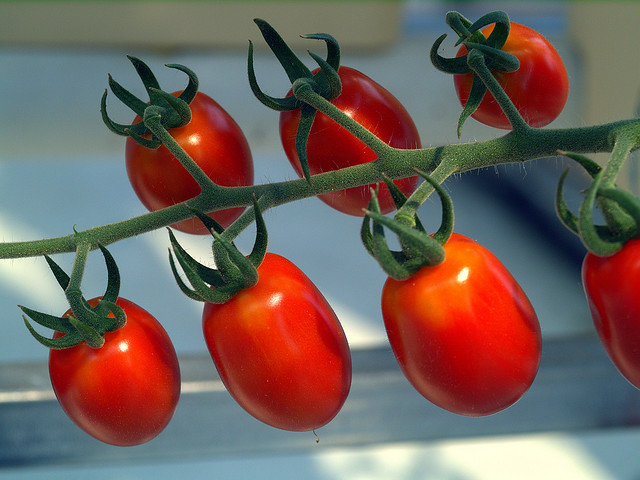Quite a few hydroponic plants are cultivated on a large, commercial scale for human consumption. Of course, not all hydroponic setups need to be to this scale, but you can clearly see the advantage of being able to grow plants at a density much higher than would be possible with traditional soil gardening. There are a number of plants that are particularly suited to growing hydroponically, or at least that have been grown hydroponically in commercial quantities. These are lettuce, strawberries and of course tomatoes.
Hydroponic Lettuce
Lettuce is a plant that has quite a small root system and is therefore particularly suited to being grown in water culture, or using the nutrient film technique (NFT). Because of the small size of each plant, hydroponic cultivation of lettuce allows for a huge density of lettuce plants to be grown.
In water culture, a large sheet of polystyrene can be floated on nutrient solution with holes cut out for each lettuce plant and an air stone in the nutrient solution used to aerate the water. As the lettuce plants use up the nutrients and water, the plants stay in contact with the nutrient solution as the polystyrene sheet simply floats. This is very efficient, very easy to set up and very easy to maintain.
The nutrient film technique can be creatively used to grow lettuce in confined spaces. PVC pipes can be used with little mesh baskets holding each lettuce plant. Lettuce can be packed very tightly. A particularly creative way to grow hydroponic lettuce is in PVC pipes or in gutters that are hung on walls in a zig-zag pattern. Nutrients are pumped up to the top pipe or gutter, from where it runs down the pipe to feed the plants and when it reaches the end, is passed down to the next pipe, which is angled in the opposite direction. Since lettuce doesn’t grow very high, quite a lot of lettuce plants can be grown on a wall.
Hydroponic Strawberries
Strawberries, from a hydroponic point of view, are much like lettuce in their suitability to particular types of hydroponic gardens. They also have a small root system and are particularly suited to growing using the nutrient film technique (NFT). Plants can be grown at a very high density in PVC pipes. The only thing that needs to be considered is that strawberries will hand down, so room needs to be allowed between each row for this to happen freely. Water culture can also be used for growing hydroponic strawberries, where the strawberries would happily rest on the polystyrene sheet.
Hydroponic Tomatoes
Often the first thing that comes to people’s minds when the word hydroponics is mentioned is hydroponic tomatoes. Tomatoes have been cultured on so large a scale using hydroponic technology, that they are routinely available from supermarkets.

Tomatoes have a medium-sized root system, larger than that of strawberries and lettuce and therefore are not ideally suited to growing with NFT technology. This is because the extensive root system and long roots can interfere with the flow of nutrients in PVC pipes and can even block them. Instead, tomatoes are particularly suited to drip systems, ebb and flow systems and aeroponics. With drip and ebb & flow systems, the tomato roots can take up as much room as they need in the grow tray, allowing them to thrive, without interfering with nutrient flow. In an aeroponics system, each plant is given sufficient room to grow and the spray lines are kept well away from the roots, preventing any interference.
Summary
Almost any plant can be grown in a hydroponic system. Developing a hydroponic garden with the plant that you intend to grow in mind allows for particular characteristics such as plant size, space needed to grow and the size of the root system to be taken into consideration. The result is an effective, trouble-free garden. Lettuce, strawberries and tomatoes are particularly suited to hydroponic cultivation, although each with its own requirements. These and other plants can be grown on a commercial scale or in the home garden using hydroponics.
Pavel Sluka is the owner of Hydroponics Habitat.
Related Articles & Free Email Newsletter
Grow Systems and Supplies for Successful Home Hydroponics




Comment here